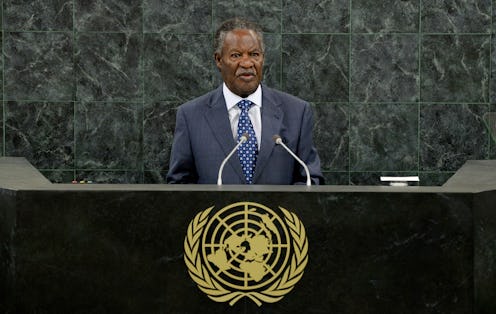News
Zambia Has a New President (For Now)
After battling health problems, Zambian President Michael Sata died while undergoing treatment in a London hospital on Tuesday. Sata, who was 77, was elected president of Zambia in 2011 and was a member of the Patriotic Front party and an opposition leader. Following Cabinet discussions on Wednesday morning, Vice President Guy Scott has been appointed interim president until presidential elections are held within 90 days, as per Zambia's constitution. Scott, who is of Scottish descent, is the first white head of state in Africa since FW de Klerk stepped down as president of South Africa in 1994.
Cabinet Secretary Roland Msiska announced to the nation on TV:
It is with a heavy heart that I announce the passing on of our beloved president.... I urge all of you to remain calm, united and peaceful during this very difficult period.
As a leader, Sata was known for his sharp tongue and tough words, which earned him the nickname "King Cobra." During his term, he focused on combating corruption and creating jobs. Prior to his presidency, Sata had been extremely critical of Chinese investors in Zambia's copper mines, denouncing their treatment of local workers. After he was elected, Sata toned down his stance, emphasizing the importance of foreign investment, but remained firm that foreign companies must abide by Zambian labor laws.
Sata's presidency has been plagued with rumors of his illness, and he was noticeably absent from the spotlight for much of it. After Zambian media criticized Sata's constant absence, the president made a surprise appearance in September and joked that he was "not dead." But speculation over his health continued, and earlier this month Sata left the country for a "medical check-up abroad," appointing Minister of Defense Edgar Lungu as acting president.
Now, Vice President Scott has been officially named interim president of Zambia, a move that he says was decided based on his "seniority within the party, in government." Scott told the Telegraph:
The president kept me as his vice-president despite a lot of efforts by people to get me taken down. And I happened to be there when he died.
Like Sata, Scott is also known for his distinct personality, which the Guardian described as "colorful" and "eccentric," noting that the 70-year-old had once said he "hates South Africans" because "they think they're the bee's knees and actually they've been the cause of so much trouble in this part of the world."
Scott frequently comments on the reactions he gets when he attends meetings with other African leaders, describing himself as a "mascot" and "a good luck charm for African politics." But more importantly, Scott's position in Zambia has been considered the nation's symbolic reconciliation with its colonial past. Scott told the Guardian in 2011, following his appointment as vice president:
I have long suspected Zambia is moving from a post-colonial to a cosmopolitan condition. People's minds are changing. They are no longer sitting back and dwelling on what was wrong about a colonialism. There's a Caribbeanisation, there's a range of colours — so what?
Well, there is one major consequence of his ethnicity. Under a constitutional clause, Scott cannot be president permanently or run for president when elections take place because his parents were not born in Zambia.
Images: Getty Images
